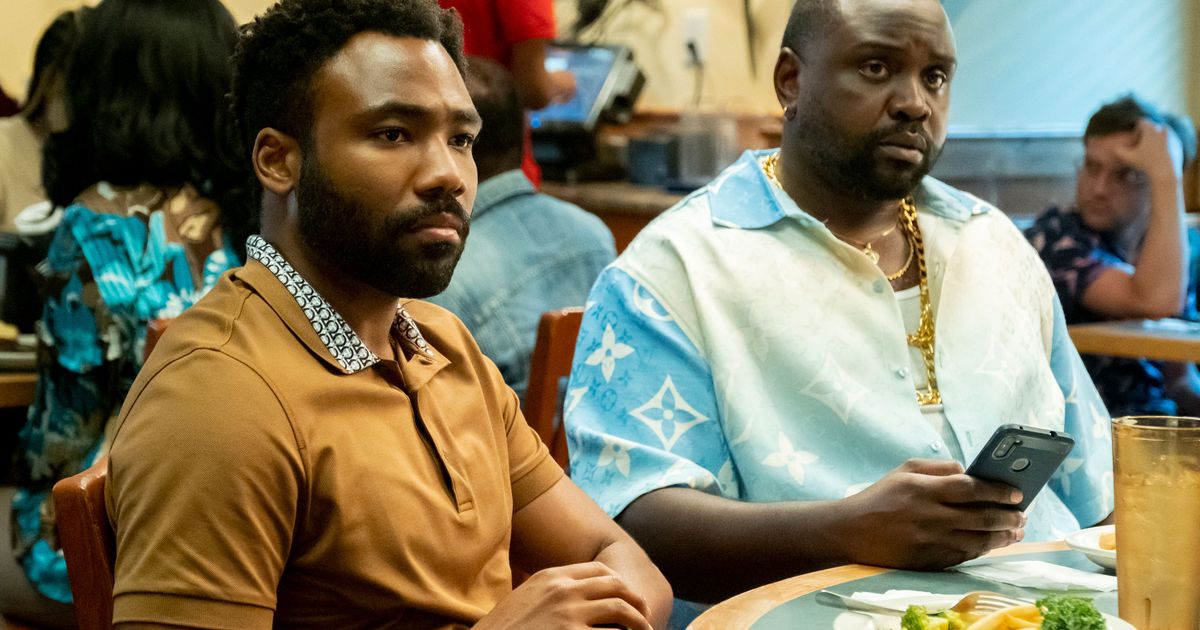
Atlanta Recap: Take Me to Church
Season 4 Episode 4 Editor’s Rating4 stars ****
Photo: Guy D’Alema/FX
Tonight, Earn spends a Sunday with his family that captures the often Shakespearean emotions and situations that come with being in a large Black family. He arrives at his parents’ home to accompany his mom, Gloria; his Aunt Jeanie; and his grandfather to church. Enjoying the spoils of retirement, Earn’s dad, Raleigh, skips out on the day of worship, opting to find salvation at the mall instead. On the way to pick up his aunt and grandfather, Earn rides shotgun after his mom insists on driving, saying his car is too small. Catching up with each other, Gloria tells Earn that she wants to “steal” her dad from her sister Jeanie’s care. She claims that in addition to being unfit to care for him, Jeanie refuses to let her see their dad. Once in the car and on the way to the service, Jeanie inquires about Lottie and Van, sanctimoniously asking when he’ll marry the “beautiful girl” he “left in sin.” Pulling up to the church entrance to let the passengers out, Gloria waits for her son and sister to exit the car and then drives off with her father in tow.
Forced to attend the service with his aunt, Earn desperately tries to get in touch with his mom. He slips away to the bathroom and calls his father, hoping to get help on how to handle the situation. Raleigh declines to help, stating that he has dealt with the family for 30 years and he’s entitled to enjoy the three hours at the mall every Sunday morning before the teenagers show up. This episode, written by Stefani Robinson, feels like many classic multigenerational stories in Black literature, like A Raisin in the Sun or Go Tell It on the Mountain. There’s a clear pide between the different generations but still an underlying understanding that we’re all cyclically bound to our families; for Earn, his father is officially passing him the baton of manhood by making him deal with the situation on his own. After decades of fulfilling his duty as the patriarch of the family, Raleigh is ready to live a carefree postretirement life. He saunters around the mostly empty mall sternly avoiding any pitches from kiosk salespeople. One woman, however, is able to get him to break his routine; she’s selling hats and successfully butters him up enough to buy a gaudy red fedora with an embroidered gold cross on the side. She even tells him the hat isn’t technically for sale yet, but “a special person deserves a special hat.”
With his new hat on his head and the effects of compliments from a beautiful woman in his ear, Raleigh walks through the mall with pride. For once, he’s not someone’s father or husband — the responsibility of his family does not anchor him; he’s simply a rejuvenated man who wants to look good and feel wanted. Trying on and buying the hat takes so long that he is still in the mall when the after-church crowd begins to populate the building. Trying to get out as fast as he can, he’s accosted by a group of teenagers in the food court. One of the more boastfully annoying boys teases him about the hat, sardonically calling him Prince (“if he never died and became some old fat n – – – -”) and then asking to take a picture with him. Raleigh tries to brush it off and leave, but the boy is incessant, getting on his knees and begging until he gets the picture, saying, “This shit ’bout to go viral.”
As his dad experiences a significant bruise to his ego, Earn is tasked with handling the “stealing” of his grandfather on his own. When he tries to dip out of the church and leave Jeanie, she stops him at the exit, proclaiming that she knows that Gloria took their dad. She refuses to leave Earn’s side and follows him to the studio. At the studio, Al is fulfilling a true bucket-list item of mine by playing Uno with Gunna (free him!) when Earn and Jeanie noisily stumble in. She immediately orders everyone out, including a very respectful Gunna, who says, “Thank you, ma’am,” when Jeanie compliments his earrings. Now alone in the room with her nephews, Jeanie breaks down into a self-flagellating routine she has clearly perfected since childhood. She gets all her siblings on a conference call, tattling to the family about Earn’s mom kidnapping their father. The rest of the siblings immediately laugh, and we get a Katt Williams cameo as Uncle Willy and a great line only Williams could deliver so perfectly: “You can’t kidnap your own dad. I don’t have time to explain it to you right now, but the word kid is in it. So mathematically, it’s impossible.”
Jeanie launches into playing the victim as her brothers and sisters continue to refuse to take her seriously. She starts listing past situations in which she felt slighted by her siblings and then when that doesn’t work, she resorts to a tale as old as time: light-skin self-pity. This is a very specific type of self-pity unique to lighter-skinned Black people — the kind of self-pity that nine times out of ten ends with “Everyone hates me because of my bright, light skin.” Jeanie says exactly that, telling her siblings they’re just bitter and they have been their whole lives. She stands in her yellow church suit as tears fall down her high-yellow face while everyone on the phone and me in my living room burst out laughing, and one sister retorts, “Girl, I hate you because you’re evil.” Jeanie sinks even lower, saying the real reason Gloria took their dad is that their father, in his old age, never remembers her. Stung by her sister’s words, Gloria hangs up.
As much as I enjoyed this episode, I felt it was a missed opportunity to rectify some of the criticism Atlanta has received about its depiction of Black women, especially since Atlanta’s sole female writer wrote it. I yearned for more complexity in Gloria’s story line specifically. Sometimes it feels as if dark-skinned Black women continue to take up as little space as possible on the show, and having Jeanie insinuate that Gloria is the least memorable of the siblings broke my heart. We learned far more about Jeanie than Gloria, which is fine if the show did not have a history of leaving out dark-skinned Black women. Even though examining light-skinned privilege and colorism was thoughtfully crafted and executed, Atlanta was once again centered on a light-skinned woman while leaving the darker ones in the background.
Jeanie takes her light-skinnedness a step further and calls the cops, showing how much her proximity to whiteness has allotted her privilege and informed her actions. The cops come to the studio and have Earn call his mom so they can perform a wellness check. They ask if everything is all right and if he knows where he is and who he’s with. He answers correctly, saying he’s with Gloria despite Jeanie’s probing that he’s in danger. As he keeps talking, it’s clear that the dementia is truly affecting him, and he tells the police that they’ve been in Egypt for two weeks. Gloria abruptly ends the call, preventing any more questions. Like their aunt, Earn and Al also fall back into childhood routines as they listen to Jeanie’s spiraling. Sinking into the couch next to each other with identical rolling eyes, you can see the ghosts of the young cousins they once were. Jeanie continues to harangue the officers after the wellness check, leaving the cousins at the end of their patience. Earn snaps when Al complains that Jeanie was even brought to the studio, telling Al he doesn’t want to end up like his mom and her siblings by fighting all the time. He’s ready to break the cycle. Coming to his cousin’s rescue, Al asks an employee of the studio if there’s a secret exit. She tells him about the Shmurda Exit, built specifically for Bobby Shmurda when he was recording while dodging his baby mamas and the FBI. Even though it didn’t work for Shmurda, she says it could work for them — as long as they don’t look back. They walk out the door, focused solely on what’s ahead.
Atlanta After-hours
• Earn’s family members convene for a meal at the end of the episode after their long days. Gloria realizes they never received their complimentary bread and insists that the waiter packs some to go. When the waiter doesn’t comply, Earn’s dad explodes at him, unleashing the irritation from the whole day. This scene was a moment that reminded me so much of my father and the Black fathers before him who dealt with a harsh, unfair reality and occasionally misplaced that anger and resentment when trying to assert respect in a world that offered them none.
• Ending the episode with Gil Scott-Heron’s “Save the Children” was an expert song choice. It complemented the multigenerational feel of the episode perfectly.
• I’ve been missing my girl Zazie Beetz! Thankfully I got a dose of her over the weekend since she was a guest on Andy Cohen’s Watch What Happens Live on Sunday. She spoke a bit about Atlanta’s series finale, saying she’s very satisfied with the episode, and she described it as a “heartful, soulful” ending, making me very excited.
• Another highlight of Beetz’s WWHL interview was finding out she has been trying to convince Donald Glover to do a Christmas special for ten years. I can definitely get behind that.
VULTURE NEWSLETTER
Keep up with all the drama of your favorite shows!This site is protected by reCAPTCHA and the Google Privacy Policy and Terms of Service apply. Vox Media, LLC Terms and Privacy Notice
<
p aria-hidden=”true”>By submitting your email, you agree to our Terms and Privacy Notice and to receive email correspondence from us.





























































